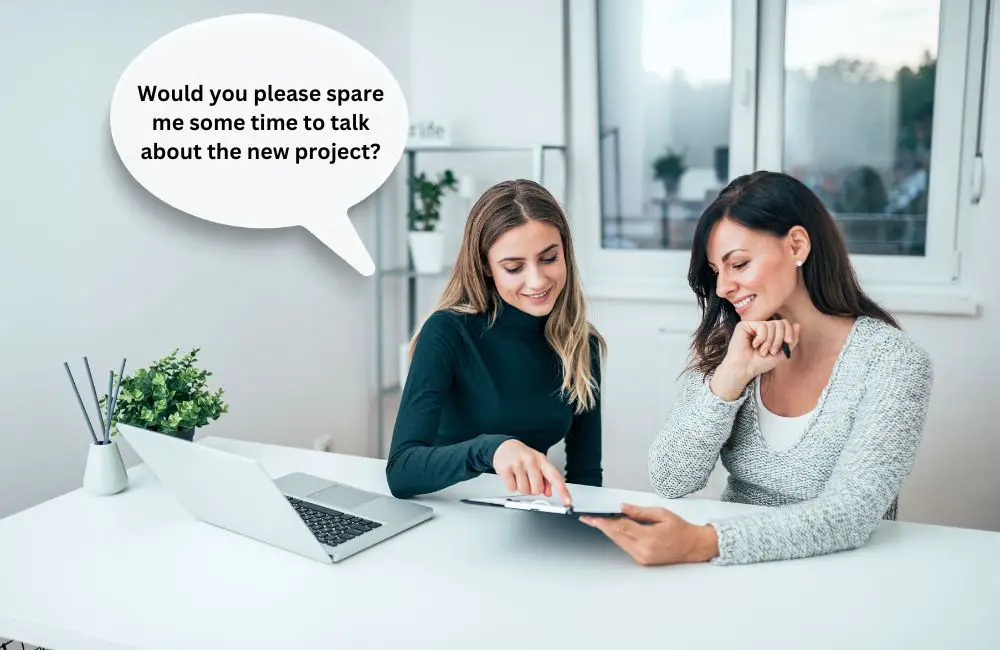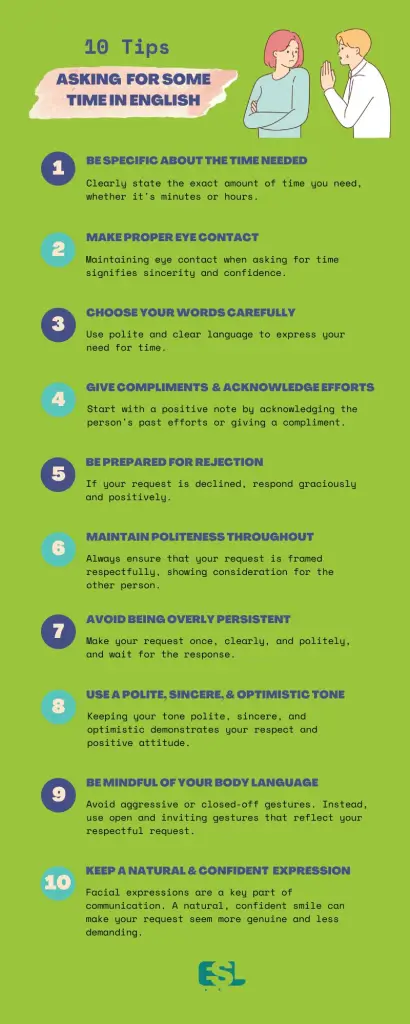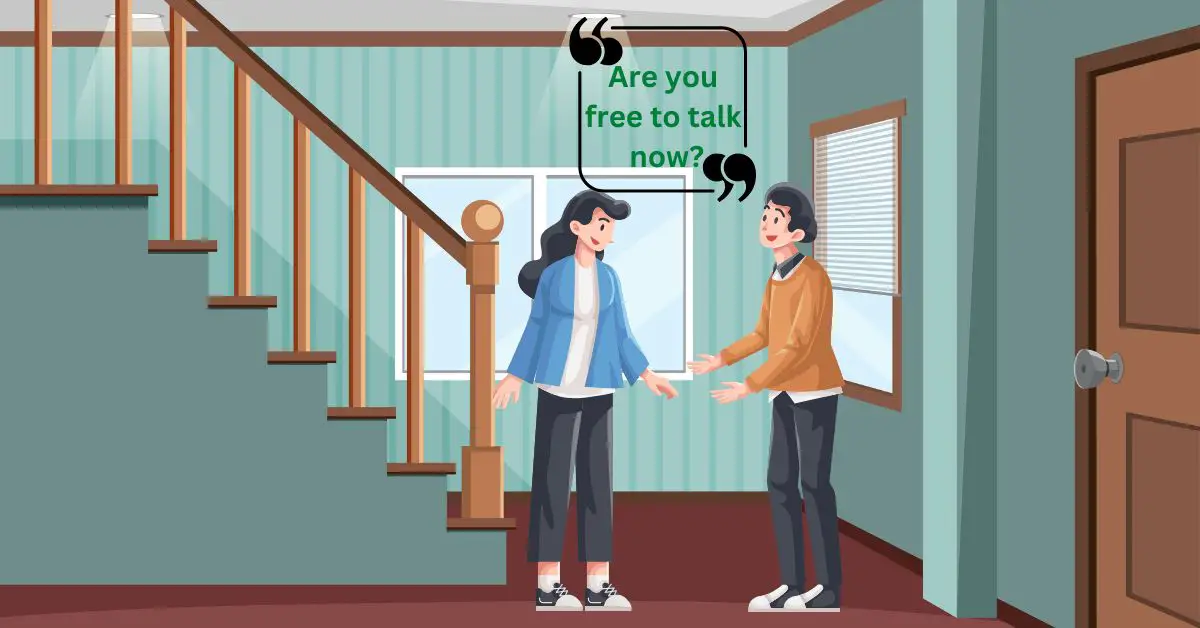This article covers the following areas –
- How to Ask for Some Time Using Modal Verbs
- Using Imperative Sentences to Ask for Some Time
- Other Ways to Ask for Some Time in English
- 10 Tips to Ask for Some Time in English
- Sample Conversation: Politely Asking for Some Time in English
- Final Thoughts
- FAQ: Asking for Some Time in English
We often ask people to give us some time to share our problems and ask for advice and help from them. So, how do you politely ask someone to give you some time at home, office, or in public places?
“Would you please give me some time?” & “May I have some of your precious time?” are generally used to ask for some time in English. Likewise, “Can I talk to you for a while?” & “Please give me some time to talk” are also used to ask for some time from someone in English politely.
Do you have in your mind right now any other common ways of asking some time from someone in English? If yes, you can share them with all of us in the comment box. Also, you can suggest any book that can help my students improve their English, as I suggest you try English Made Easy Volume One: A New ESL Approach: Learning English Through Pictures (Amazon Link). This book creatively uses pictures and text in tandem to revolutionize English language learning, making it easier to understand and more effective overall.
You may need to ask for some time from the people surrounding you on different occasions for different purposes. For example, maybe you want to ask them to talk to you or ask for help with anything in particular. No matter your purpose, you should ask if they are available at your expected time.
When you are sure someone is available to talk or help you, you can politely request them to give you some time. We can ask for some time from someone in English in different ways.
How to Ask for Some Time Using Modal Verbs

Modal auxiliary verbs are pretty commonly used to make polite expressions in English. So whether you ask for permission, make any requests, or offer someone something, modal auxiliary verbs can greatly serve your purpose.
Here, while you ask for some time from someone, using modal auxiliary verbs is the best way to do it. Here are some examples of such expressions.
- Would/Could you please give me some time?
- Will/Can you please give me some time?
- Could/Would you please spare some time for me?
- Can/Will you please spare some time for me?
- Would/Could you please consider giving me some time?
- Will/Can you please consider giving me some time?
- Could/Would you please let me talk to you for a while?
- Can/Will you please let me talk to you for a while?
- Would/Could you please care for giving me some time when you are available?
- Will/Can you please care for giving me some time when you are available?
- May I ask for some time from you?
- Can I ask for some time from you?
- Would you mind if I ask for some time from you?
- Will you mind if I ask for some time from you?
Using Imperative Sentences to Ask for Some Time

We know that imperative sentences are primarily used to make requests and commands. While you ask for some time from someone, you actually make requests to them. So, using imperative sentences is one of the best ways to do it. Here are some example sentences.
- Please give me some time.
- Give me a moment, please.
- Please give me some of your precious time.
- Let me know if you have some time to spare for me.
- Please don’t forget to tell me when you are free.
- Kindly give me some time after office, please.
- I request you to make some free time for me.
- Spare me some time, please.
Other Ways to Ask for Some Time in English

There are some other ways by which you can make polite expressions to ask someone to give you some time. For example, you can use some interrogative sentences and other forms of sentences to ask for some time from someone. Here are some examples.
- Is it ok if I ask for some time from you?
- Is this possible to give me some time?
- Is your schedule open tomorrow? I need to talk about an important issue.
- Is this a good time to come to your place? We should talk.
- Is there any scope that you give me just 5 minutes?
- Do you have some time to spare for me?
- Do you mind giving me some time?
- What are you up to this evening? I would like to talk about something.
- What’s your plan for tomorrow? Let’s settle down the matter.
- What are you doing this afternoon? Can we have a short online meeting?
- Are you free this afternoon? I want to share something with you.
- Are you free to talk now?
- Are you available to give me some time at this moment?
- I need some time from you to sit and talk about something.
- I find it necessary to talk to you about the next deal. Are you free next Sunday?
- Your suggestions matter a lot to me. Would you please give me some time so that I can talk about my problems?
- Your advice is always a guideline for me. So please let me know when I can talk to you.
10 Tips to Ask for Some Time in English
When asking for time from someone, the approach and manner in which the request is made can greatly influence the response. Awareness of certain key aspects, such as the choice of words, body language, and the tone of the request, is essential. Below are detailed tips to ensure your request is both respectful and effective.

Well, before moving to the tips, I would like to share about a book that can help you improve your conversational skills. 110 Real Life English Conversations (Amazon Link) is a great book for ESL learners and teachers as it provides various conversation and situational dialogues, 223 everyday English expressions, and idioms. It’ll certainly help you to gain the confidence to speak English in real life.
#1 Be Specific About the Time Needed
When requesting time, specificity is key. Clearly state the exact amount of time you need, whether it’s minutes or hours. This shows respect for the other person’s time and helps them understand your needs better. For example, saying, “May I have 15 minutes of your time to discuss something important?” is more effective than a vague request.
#2 Make Proper Eye Contact
Eye contact is a powerful tool in communication. Maintaining eye contact when asking for time signifies sincerity and confidence. It shows you are genuinely interested in the interaction and respectful towards the person you are addressing.
#3 Choose Your Words Carefully
The words you choose can significantly impact the response to your request. Use polite and clear language to express your need for time. Phrases like “Would it be possible for me to have a few minutes?” are both courteous and direct.
#4 Give Compliments and Acknowledge Past Efforts
Start with a positive note by acknowledging the person’s past efforts or giving a compliment. This creates a favorable environment and shows appreciation, making the person more inclined to grant your request.
#5 Be Prepared for Rejection
Understanding that not all requests will be met with a ‘yes’ is important. If your request is declined, respond graciously and positively. This shows maturity and respect for the other person’s decision.
#6 Maintain Politeness Throughout
Politeness is crucial, irrespective of whom you are addressing. Always ensure that your request is framed respectfully, showing consideration for the other person, whether they are younger, older, known, or unknown to you.
#7 Avoid Being Overly Persistent
Repeatedly asking for time can be perceived as pressuring. Make your request once, clearly, and politely, and wait for the response. If the answer is negative, respect their decision without insisting.
#8 Use a Polite, Sincere, and Optimistic Tone
The tone of your voice conveys a lot about your intentions. Keep your tone polite, sincere, and optimistic. This demonstrates your respect and positive attitude, making it more likely for your request to be considered.
#9 Be Mindful of Your Body Language
Your body language should reflect politeness and sincerity. Avoid aggressive or closed-off gestures. Instead, use open and inviting gestures that reflect your respectful request.
For those who want to improve their non-verbal communication, I would suggest Brandon Cooper’s Body Language Mastery: 4 Books in 1 (Amazon Link). I believe this book is the ultimate psychology guide to analyzing, reading, and influencing people using body language, emotional intelligence, psychological persuasion, and manipulation.
#10 Keep a Natural and Confident Facial Expression
Facial expressions are a key part of communication. A natural, confident smile can make your request seem more genuine and less demanding. It helps create a positive interaction, increasing the likelihood of a favorable response.
Sample Conversation: Politely Asking for Some Time in English
Situation: Sophie is working on a project and realizes she needs more time to complete it. She approaches her supervisor, Mr. Green, to discuss an extension.
Sophie: Excuse me, Mr. Green. May I discuss something regarding the current project?
Mr. Green: Of course, Sophie. What’s on your mind?
Sophie: I’ve been reviewing the requirements, and to ensure the quality of the work, I believe I might need a bit more time. Would it be possible to extend the deadline by a couple of days?
Mr. Green: I appreciate you being upfront about it. Let’s see… How about a two-day extension? Does that work for you?
Sophie: That would be perfect. Thank you for understanding. I’ll ensure that the final output is up to our standards.
Mr. Green: I trust your judgment, Sophie. Just keep me updated on the progress.
Final Thoughts
The art of politely asking for more time in English involves a blend of linguistic tact and interpersonal skills. Whether you’re using modal verbs to soften your requests, employing imperative sentences with a gentle tone, or exploring other varied expressions, the key lies in being respectful and clear in your communication.
The ten practical tips provided offer a comprehensive guide to making such requests effectively, emphasizing the importance of politeness, appropriate body language, and consideration for the other person’s time and commitments.
Remember, the way you ask for time can significantly impact the response you receive. It’s not just about what you say but also how you say it. Using the right phrases, maintaining a respectful tone, and showing gratitude for any flexibility shown are all crucial elements of a successful request.
By applying these techniques, you’ll be better equipped to navigate situations where you need a little more time while maintaining positive relationships in both personal and professional settings. Effective communication is about understanding and empathy – by putting yourself in the other person’s shoes, you can find the best way to ask for that extra time you need.
FAQ: Asking for Some Time in English
1. Why is it crucial to be polite when asking for more time?
Politeness is like showing respect. When you are polite, the person you’re asking understands that you value their time and schedule. This makes them more likely to listen to you and maybe even agree to give you more time.
2. What are some courteous phrases to use when requesting additional time?
You can say things like, “Could I have a bit more time, please?” or “Would it be possible to extend the deadline?” Another nice way to ask is, “I’d appreciate a few more days if that’s okay.” These phrases are respectful and show that you’re not demanding but asking.
3. How can I justify my request for more time without sounding like I’m making excuses?
Just be honest and straightforward. Tell them why you need more time in a way that focuses on doing a good job. For example, “I need a couple more days to ensure everything is perfect” sounds sincere and responsible.
4. Is it better to ask for more time sooner rather than later?
Definitely! If you ask early, it shows that you’re thinking ahead and being responsible. It also gives the other person more time to adjust their plans, which they’ll probably appreciate.
5. What should I do if my request for more time is declined?
If they say no, say, “Thank you for considering,” and then try your best to finish the work by the original deadline. It’s important to show that you respect their decision.
6. How can I show appreciation if my request for more time is granted?
A simple “Thank you for understanding” or “I really appreciate your flexibility” shows that you’re grateful for their help. It’s a nice way to acknowledge that they’ve done you a favor.
7. Can I request more time more than once for the same task?
It’s usually not a good idea to ask for more time for the same task. If you do it often, people might think you’re not very good at planning or getting things done on time.
8. What’s the best way to communicate my request for more time?
If you can, talk to the person face-to-face or on the phone. It’s more personal that way. But an email might be better if you work with someone far away or in a very formal situation.
9. Should I offer compensation or solutions when asking for more time?
You don’t always have to, but offering a solution or saying how you’ll ensure this delay doesn’t cause problems can be nice. It shows that you care about not making things difficult for the other person.
10. How can I ensure I don’t frequently need to ask for more time?
Plan your work well and be realistic about what you can do in the time you have. Good planning and time management can help you avoid situations where you need to ask for more time.
If you have further questions or suggestions about anything specific related to this topic or anything else related to learning English as a second language, feel free to ask me in the comment box. You may also help the ESLA community by putting your valuable suggestions here to help every member improve their English language skills.





